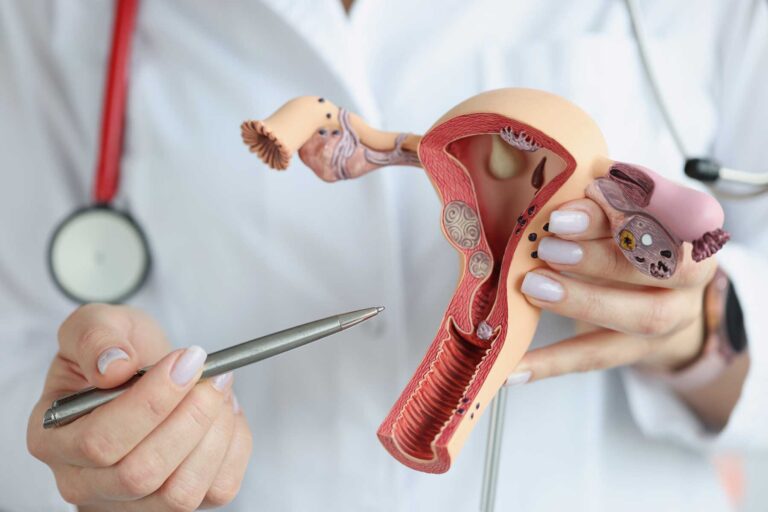Well, it’s September, and that means it’s time for . . . pumpkin spice lattes? No, September is Sexual Health Month, which means it’s time to talk about pelvic floors and sexual health. If painful sex is keeping you from fully enjoying your life, this doesn’t have to be the status quo.
Before we dive right in to the issue of painful sex, otherwise known by its fancy name – dyspareunia, there are a few things we need to discuss, in general, about pelvic floor anatomy.
Have you ever really thought about pelvic floor anatomy? Frankly, most people have not, but learning a bit about pelvic floor muscles and how they function can help you truly understand the causes of issues such as painful sex, incontinence and so forth.
See Also

Postpartum Power
Our body contains an assortment of muscles – cardiac, smooth and skeletal. The pelvic floor is a group of skeletal muscles that basically surround your pelvic bones, also known as the pelvic bowl or pelvic basin.
These muscles have 3 main jobs:
Support – They hold everything together, so to speak
Continence – They help you keep urine and feces in
Sexual – They allow for penetration and aid in orgasm
Now, let’s talk about sex. Grab a glass of wine (or that pumpkin spiced latte if you are so inclined,) and buckle up.
In an ideal scenario, these pelvic floor muscles are meant to lengthen (essentially relax) and allow penetration into your vaginal canal. If they do the opposite and contract, this can cause difficult and painful penetration, due to the muscles taking up space in the vaginal canal.
When those muscles are contracted, they can become chronically short, and this means it’s gonna be tough for them to lengthen and allow for penetration. This contraction of the muscles can be a cause of painful sex as well as other forms of penetration (tampon use or speculum exam).
The same thing can happen in other parts of our body with other skeletal muscles. For instance, if you tend to clench your jaw all of the time, this can cause temporomandibular pain. If you’ve ever suffered from a “charley horse,” you’ve experienced the pain of muscle contraction. Well, pelvic floor muscles can be just the same, they can be too tight and this tightening, or spasm, can cause painful sex.
Why does this happen?
There can be several reasons. For those breastfeeding mamas who are suffering from painful sex, this pelvic floor issue could be caused by a lack of estrogen. When we breastfeed, our bodies actually will suppress estrogen so that we don’t ovulate and can make milk for our little ones.
Quick side note:
Yes, breastfeeding can stop ovulation, but it’s in no way a foolproof method of birth control, so please don’t count on it.
Ok, back to painful sex. So, you’re breastfeeding and those estrogen levels are low. This can cause issues. Unfortunately, the vagina is a very estrogen-dependent organ. When estrogen levels drop, the tissue around the opening of your vagina can become a bit frail, causing dryness and irritation.
If you’ve ever suffered from that “sandpaper” feeling in your vagina, you understand what I’m talking about. That lack of estrogen can be the cause of that raw, dry or burning feeling you are experiencing with intercourse.
So, what’s a woman to do? In some cases, a topical estrogen cream can be helpful, when it’s safe to take and your doctor prescribes it. Additionally, a high-quality lubricant can be used in conjunction with the estrogen cream to help eliminate this discomfort. The good news is that this estrogen-related issue tends to dissipate once your normal menstrual cycles return.
Of course, it’s not always just about the estrogen levels. In some cases, you might be facing low estrogen and some muscle or nerve issues. Perhaps those pelvic muscles are tight or maybe you’ve got a scar down there resulting from a perineal tear or repair. This is a wicked combo and it absolutely needs to be treated. Pelvic floor physical therapy (PT) can be a huge help!
On the flip side, there are certain things that are the opposite of helpful. For instance, if you share your concerns with a health provider and their response is either, “oh just have a glass of wine and relax,” or maybe “that’s normal,” it’s time to run away from that provider, as quickly as possible.
Painful sex is not normal! First, it’s important rule out any sort of medical issue or infection, and then it’s absolutely a great idea to seek out a pelvic floor PT to assess any musculoskeletal or mechanical contributor.
We can teach you a bunch and provide you with strategies and tools to help make sex comfortable and fun again. What’s the takeaway from all of this? Y’all, pain with sex isn’t normal, and your pelvic floor can be a contributing factor to these symptoms. It’s definitely worth seeing a pelvic floor PT to see what’s up down there.
Of course, we aren’t just here for those breastfeeding mamas. Painful sex can happen to women at any time. For instance, it’s common for some pre-menopausal and post-menopausal women to suffer from painful sex. We are here to help and empower women of all ages and allow them to live their lives to the fullest at any age.
If you are suffering from painful sex, please contact us today. We also can help with other pelvic floor issues, such as incontinence, C-section or perineal scar discomfort, pelvic organ prolapse and much more.








